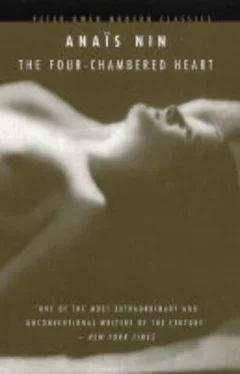Anaïs Nin - The Four-Chambered Heart
Здесь есть возможность читать онлайн «Anaïs Nin - The Four-Chambered Heart» весь текст электронной книги совершенно бесплатно (целиком полную версию без сокращений). В некоторых случаях можно слушать аудио, скачать через торрент в формате fb2 и присутствует краткое содержание. Год выпуска: 2004, ISBN: 2004, Издательство: Peter Owen Limited, Жанр: Классическая проза, Эротические любовные романы, на английском языке. Описание произведения, (предисловие) а так же отзывы посетителей доступны на портале библиотеки ЛибКат.
- Название:The Four-Chambered Heart
- Автор:
- Издательство:Peter Owen Limited
- Жанр:
- Год:2004
- ISBN:9780720611557
- Рейтинг книги:3 / 5. Голосов: 1
-
Избранное:Добавить в избранное
- Отзывы:
-
Ваша оценка:
- 60
- 1
- 2
- 3
- 4
- 5
The Four-Chambered Heart: краткое содержание, описание и аннотация
Предлагаем к чтению аннотацию, описание, краткое содержание или предисловие (зависит от того, что написал сам автор книги «The Four-Chambered Heart»). Если вы не нашли необходимую информацию о книге — напишите в комментариях, мы постараемся отыскать её.
The Four-Chambered Heart — читать онлайн бесплатно полную книгу (весь текст) целиком
Ниже представлен текст книги, разбитый по страницам. Система сохранения места последней прочитанной страницы, позволяет с удобством читать онлайн бесплатно книгу «The Four-Chambered Heart», без необходимости каждый раз заново искать на чём Вы остановились. Поставьте закладку, и сможете в любой момент перейти на страницу, на которой закончили чтение.
Интервал:
Закладка:
Against the smoke and brume of their caresses, these brusque changes of mood, when the barge ceased to be the cell of a mysterious new life, an enchanted refuge; when it became the site of compressed angers, like a load of dynamite boxes awaiting explosion.
For Rango’s angers and battles with the world turned to poison. The world was to blame for everything. The world was to blame for Zora having been born very poor, of an insane mother, of a father who ran away. The world was to blame for her undernourishment, her ill health, her precocious marriage, her troubles. The doctors were to blame for her not getting well. The public was to blame for not understanding her dances. The house owner should have let them off without paying rent. The grocer had no right to claim his due. They were poor and had a right to mercy.
The noise of the chain tying and untying the rowboat, the fury of the winter Seine, the suicides from the bridge, the old watchman banging his pails together as he leaped over the gangplank and down the stairs, the water seeping too fast into the hold of the barge not pumped, the dampness gathering and painting shoes and clothes with mildew. Holes in the floor, unrepaired, through which the water gleamed like the eyes of the river, and through which the legs of the chairs kept falling like an animal’s leg caught in a trap.
Rango said: “My mother told me once: how can you hope to play the piano, you have the hands of a savage.”
“No,” said Djuna, “your hands are just like you. Three of the fingers are strong and savage, but these last two, the smallest, are sensitive and delicate. Your hand is just like you; the core is tender within a dark and violent nature. When you trust, you are tender and delicate, but when you doubt, you are dangerous and destructive.”
“I always took the side of the rebel. Once I was appointed chief of police in my home town, and sent with a posse to capture a bandit who had been terrorizing the Indian villages. When I got there I made friends with the bandit and we played cards and drank all night.”
“What killed your faith in love, Rango? You were never betrayed.”
“I don’t accept your having loved anyone before you knew me.”
Djuna was silent, thinking that jealousy of the past was unfounded, thinking that the deepest possessions and caresses were stored away in the attics of the heart but had no power to revive and enter the present lighted rooms. They lay wrapped in twilight and dust, and if an old association caused an old sensation to revive it was but for an instant, like an echo, intermittent and transitory. Life carries away, dims, and mutes the most indelible experiences down the River Styx of vanished worlds. The body has its cores and its peripheries and such a mysterious way of maintaining intruders on the outer rim. A million cells protect the coreof a deep love from ghostly invasions, from any recurrences of past loves.
An intense, a vivid present was the best exorcist of the past.
So that whenever Rango began his inquisitorial searchings into her memory, hoping to find an intruder, to battle Paul, Djuna laughed: “But your jealousy is necrophilic! You’re opening tombs!”
“But what a love you have for the dead! I’m sure you visit them every day with flowers.”
“Today I have not been to the cemetery, Rango!”
“When you are here I know you are mine. But when you go up those little stairs, out of the barge, walking in your quick quick way, you enter another world, and you are no longer mine.”
“But you, too, Rango, when you climb those stairs, you enter another world, and you are no longer mine. You belong to Zora then, to your friends, to the cafe, to politics.”
(Why is he so quick to cry treachery? No two caresses ever resemble each other. Every lover holds a new body until he fills it with his essence, and no two essences are the same, and no flavor is ever repeated…)
“I love your ears, Djuna. They are small and delicate. All my life I dreamed of ears like yours.”
“And looking for ears you found me!”
He laughed with all of himself, his eyes closing like a cat’s, both lids meeting. His laughter made his high cheekbone even fuller, and he looked at times like a very noble lion.
“I want to become someone in the world. We’re living on top of a volcano. You may need my strength. I want to be able to take care of you.”
“Rango, I understand your life. You have a great force in you, but there is something impeding you, blocking you. What is it? This great explosive force in you, it is all wasted. You pretend to be indifferent, nonchalant, reckless, but I feel you care deep down. Sometimes you look like Peter the Great, when he was building a city on a swamp, rescuing the weak, charging in battle. Why do you drown the dynamite in you in wine? Why are you so afraid to create? Why do you put so many obstacles in your own way? You drown your strength, you waste it. You should be constructing…”
She kissed him, seeking and searching to understand him, to kiss the secret Rango so that it would rise to the surface, become visible and accessible.
And then he revealed the secret of his behavior to her in words which made her heart contract: “It’s useless, Djuna. Zora and I are victims of fatality. Everything I’ve tried has failed. I have bad luck. Everyone has harmed me, from my family on, friends, everyone. Everything has become twisted, and useless.”
“But Rango, I don’t believe in fatality. There is an inner pattern of character which you cascover and you can alter. It’s only the romantic who believes we are victims of a destiny. And you always talk against the romantic.”
Rango shook his head vehemently, impatiently. “You can’t tamper with nature. One just is. Nature cannot be controlled. One is born with a certain character and if that is one’s fate, as you say, well, there is nothing to be done. Character cannot be changed.”
He had those instinctive illuminations, flashes of intuition, but they were intermittent, like lightning in a stormy sky, and then in between he would go blind again.
The goodness which at times shone so brilliantly in him was a goodness without insight, too; he was not even aware of the changes from goodness to anger, and could not conjure any understanding against his violent outbursts.
Djuna feared those changes. His face at times beautiful, human, and near, at others twisted, cruel, and bitter. She wanted to know what caused the changes, to avert the havoc they caused, but he eluded all efforts at understanding.
She wished she had never told him anything about her past.
She remembered what incited her to talk. It was during the early part of the relationship, when one night he had leaned over and whispered: “You are an angel. I can’t believe you can be taken like a woman.” And he had hesitated for an instant to embrace her.
She had rushed to disprove it, eagerly denying it. She had as great a fear of being told that she was an angel as other women had of their demon being exposed. She felt it was not true, that she had a demon in her as everyone had, but that she controlled it rigidly, never allowing it to cause harm.
She also had a fear that this image of the angel would eclipse the woman in her who wanted an earthy bond. An angel to her was the least desirable of bedfellows!
To talk about her past had been her way to say: “I am a woman, not an angel.”
“A sensual angel,” then he conceded. But what he registered was her obedience to her impulses, her capacity for love, her gift of herself, on which to base henceforth his doubts of her fidelity.
“And you’re Vesuvius,” she said laughing. “Whenever I talk about understanding, mastering, changing, you get as angry as an earthquake. You have no faith that destiny can be changed.”
Читать дальшеИнтервал:
Закладка:
Похожие книги на «The Four-Chambered Heart»
Представляем Вашему вниманию похожие книги на «The Four-Chambered Heart» списком для выбора. Мы отобрали схожую по названию и смыслу литературу в надежде предоставить читателям больше вариантов отыскать новые, интересные, ещё непрочитанные произведения.
Обсуждение, отзывы о книге «The Four-Chambered Heart» и просто собственные мнения читателей. Оставьте ваши комментарии, напишите, что Вы думаете о произведении, его смысле или главных героях. Укажите что конкретно понравилось, а что нет, и почему Вы так считаете.












